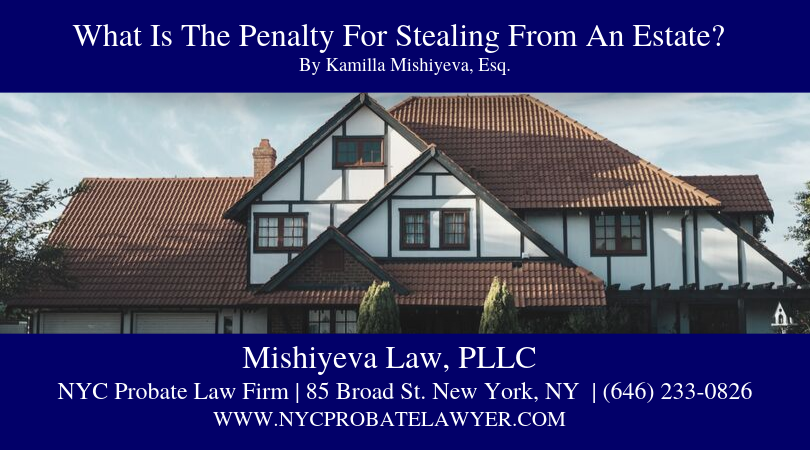What Is The Penalty For Stealing From An Estate?

These days, there is a paper trail for everything. That is to say, stealing from an estate is not an easy task and can easily come to light with proper inquiry. Still, despite the dangerous ground, we regularly come across cases of estate embezzlement, commingling of funds, and self-dealing acts. Serving as an estate administrator or executor is a matter that requires the utmost care, and its success hinges on the presumption that the fiduciary is acting in the best interest of the estate. Besides the criminal charges that may be associated with theft, the following are some civil ramifications and penalties an estate fiduciary may face in New York Surrogate’s Court.
Removal of Estate Fiduciary as a Penalty
A New York estate administrator, executor or trustee can be removed as the fiduciary of an estate or trust per New York Surrogate’s Court Procedure Act (SCPA) Section 711 or 719. With respect to theft, SCPA 711, in short, provides that an estate fiduciary can be removed where he has wasted or improperly applied or managed estate assets. Some examples include using an estate bank account as your own personal piggybank, commingling assets, wasting assets on unnecessary purchases and/or expenses, unauthorized withdrawals and improper distributions. Such acts constitute abuse of power and possibly fraud, because the estate bank account is reserved only for legitimate estate expenses and distributions to the rightful heirs and beneficiaries of a will. It is not to be used for personal expenditures.
With a proper removal proceeding and evidence of fiduciary impropriety, the present administrator or executor can be removed and a new person is appointed to manage estate. Removal and the revocation of the executor’s letters testamentary or revocation of the administrator’s letters of administration is the most common penalty for fiduciary wrongdoing. When bringing a removal petition, the end goal should be the issuance of a court order stripping the person of their authority to act on behalf of the estate. When letters testamentary or letters of administration are revoked, that person loses all control in the management of estate affairs. A new estate fiduciary steps into the old fiduciary’s shoes and takes over all aspects of the estate. In the event that there is no interested party available or eligible to act as executor or administrator, the court will appoint a public administrator to oversee assets and settle the estate. Make sure to discuss all possible outcomes with your probate lawyer.
Costs & Legal Fees as a Penalty
When norms and practices are discarded, in order to salvage the estate, it’s many times necessary to seek court intervention. Removal proceedings take a long time and can take a toll on the parties and estate assets. In addition to being removed as fiduciary, the transgressor may be ordered to pay costs and legal fees associated with bringing the removal court proceeding. Estate litigation is not cheap and most probate lawyers charge hourly. In order to remove someone as executor or administrator, a formal proceeding must be brought before the court for review and consideration. There is no such thing as a quick fix without a review of evidence and allowing the accused party the opportunity to defend themselves. First, before the judge makes a decision, she normally would carefully review the submitted evidence and schedule a hearing to hear both sides. Either way, whether the fiduciary is ultimately removed or not, the documents submitted in the proceeding remain a public record for anyone to see.
As there is no reason to punish the whistleblower, as a penalty for stealing from an estate, the wrongdoer may be ordered to pay the petitioner’s court costs and legal fees for bringing the proceeding. This remedy is not automatic and must be asked for in the petition. An additional hearing may be necessary to determine costs. The petitioner’s estate attorney will have to submit their billing statement and time records. If the transgressor is unable to pay costs and estate lawyer fees out of pocket, these fees can be deducted from the person’s inheritance share or fiduciary commissions (if any are due).
To remove remove a fiduciary and revoke their letters, the court filing fee is $75.00. Here is a helpful link on the topic.
Reimbursement & Interest as a Penalty
Making the beneficiaries of a will or an heir of estate whole is a common remedy. An easy example is a court order directing the wrongdoer to return what they stole. For example, if Ana as the executor, stole $20,000 from the estate, she will be ordered to return the money back or it must be deducted from her share of estate (if any). Improper distribution is another example. If the former executor or administrator is unable to pay back the estate, a judgment can be entered against him with a penalty of interest on the balance at 9% per annum. To lean more about how interest is calculated, click here.
Contact Us
To learn more about how we can help you with a thieving executor, administrator or trustee, contact us at 646-233-0826.